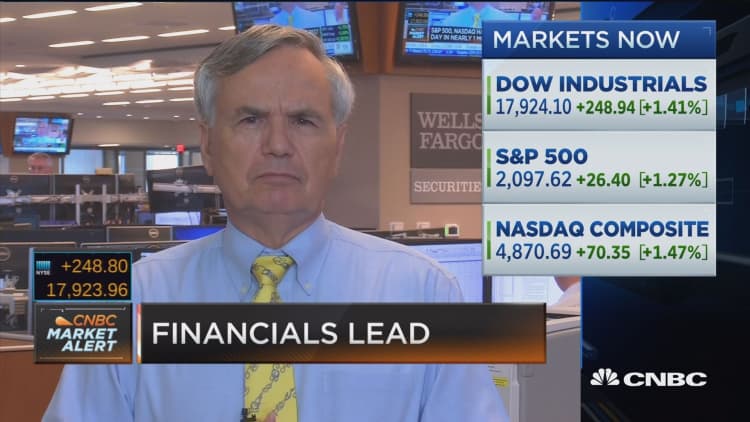Prospects for world stock markets and the global economy have perhaps never rested so heavily on a single vote in a single country as they do this week ahead of the historic referendum taking place in the U.K. on Thursday to decide whether Britain remains in the European Union.
Stock markets have reacted strongly in the past few weeks depending on which way British polls happen to be pointing. Shares fell and bond yields hit record lows last week when polls showed the leave vote gaining strength. On Monday, U.S. stocks leaped, and European shares surged even more, as three more polls showed the stay vote regaining a slim lead.
Speaking over the weekend, U.K. Prime Minister David Cameron said that a vote to leave the EU would create "debilitating uncertainty" for up to a decade and that there would be "no turning back" for the U.K., which would be left "permanently poorer."
It's not just the effect on U.K. growth that has spooked international markets. It's the possible spillover effects for the rest of Europe, and with it the global economy. A leave victory would mark a symbolic change of direction to the post-World War II status quo of ever-increasing collaboration in Europe. Similar movements exist across Europe, including within major economies like Germany, France and Italy. It's feared that if the EU's second biggest economy voted to leave next week, that others may follow, and the European Union could collapse.
At a time when global growth is anemic and monetary policy is already at the extremes of accommodation, there are fears that the European economy could be pushed into recession by a British exit, and perhaps the global economy, too.

It should be noted that if Britain does vote to leave, nothing legally binding happens. It would just show that the wish of the British people is to leave the EU, and negotiations would begin to set the terms of divorce. Thus, immediate financial contagion for the rest of the world would be limited. The possible political fallout for other European countries is the major fear, and that would take months to materialize. The focus would be elections in Spain this summer, and then in France and Germany next year.
Either way, economists are (for once!) largely united that a Brexit vote would lower global growth. The IMF said last week that Britain's economy could be 5.6 percent smaller than a baseline forecast by 2019, and said that the effects would be "negative and substantial." The OECD said recently that it would cost the U.K. 0.5 percent of its GDP this year. U.S. companies with exposure to the U.K. and Europe will certainly be affected.
The leave camp disagrees with the gloomy forecasts, saying that in the long term, the U.K. economy would benefit. And more relevant to that side are the arguments on sovereignty and immigration.
The sovereignty argument is summed up by leading leave campaigner Michael Gove, who recently said "that the decisions which govern all our lives, the laws we must all obey and the taxes we must all pay should be decided by people we choose and who we can throw out if we want change. But our membership of the European Union prevents us being able to change huge swathes of law and stops us being able to choose who makes critical decisions which affect all our lives."
Gove will appear on CNBC's "Squawk Box" on Tuesday.
The remain camp by contrast argues that the size of the body of laws from Europe imposed on Britain is vastly exaggerated by the leave camp, and that Britain does get to appoint its own member of the European Commission that shapes EU law.
The immigration issue, in particular, is hugely divisive. In the U.K. it is more a debate about jobs and the cost of welfare benefits than security, but all are relevant considerations. All members of the EU are equal European citizens, and can travel freely to work or holiday across its 28 nations. Given the relatively high living standard in the U.K., it receives positive net migration of people from the EU each year.


